| | | | | | | Presented By Raytheon Technologies | | | | Axios World | | By Dave Lawler ·Feb 01, 2021 | | Welcome back to Axios World. - We're starting tonight with the growing tendency of authorities to shut down the internet when they're facing an uprising or plotting a coup (1,664 words, 6 minutes).
- I hope the internet is humming along and the atmosphere coup-free wherever you are.
Sign up if you haven't yet, and tell a friend! | | | | | | 1 big thing: The coup will take place offline |  Data: Axios analysis of NetBlocks reports; Map: Andrew Witherspoon/Axios Where there's a coup, there will probably be an internet outage. Why it matters: Internet disruptions in Myanmar early Monday morning coincided with reports that top politicians, including the country's de facto leader Aung San Suu Kyi, were being rounded up by the military. That's no surprise: Internet blackouts are now common around the world when power hangs in the balance. The big picture: At least 35 countries have restricted access to the internet or social media platforms at least once since 2019, according to NetBlocks, a group that tracks internet freedom. Authorities have used the outages to reduce or prevent unrest — or to hide it from public view. Driving the news: Myanmar's military followed the tried-and-true rule of coup plotters everywhere by ensuring it was in control of state TV before making its move on Monday. But it also appeared to follow the more modern playbook. - Internet disruptions began at around 3am local time, according to NetBlocks, and connectivity had by 8am dropped by 50% before being "partially restored" by the afternoon.
- Flashback: In 2019, Myanmar imposed what Human Rights Watch has described as "the world's longest internet shutdown" in the conflict-ridden Rakhine and Chin states.
Between the lines: The internet was created to democratize information, but it's now one of the most powerful weapons autocrats use to silence dissenters and maintain power, Axios' Sara Fischer notes. - Iran and Venezuela are particularly quick to restrict access, according to NetBlocks' data.
- Ethiopia has repeatedly done so during mass protests, and the government blocked internet and telecom access in the Tigray region ahead of a military offensive there last November — severely impacting the availability of reliable information about the conflict.
- India has disrupted the internet both in response to protests and as a pre-emptive tactic. The government shut off the internet in August 2019 as it anticipated unrest in Indian-administered Kashmir once highly sensitive constitutional changes were announced. It has still not been fully restored.
Between the lines: Authorities often cite a desire to stop the spread of disinformation when implementing internet shutdowns, as in Sri Lanka in 2019 following deadly bombings. - Turkey temporarily blocked access to several social media platforms last February amid reports that dozens of Turkish troops had been killed in an airstrike in Syria.
- Then there are countries like China where the internet is highly censored to begin with.
Go deeper: China is arresting citizens for posting criticism on social media. |     | | | | | | 2. Power politics in Southeast Asia | 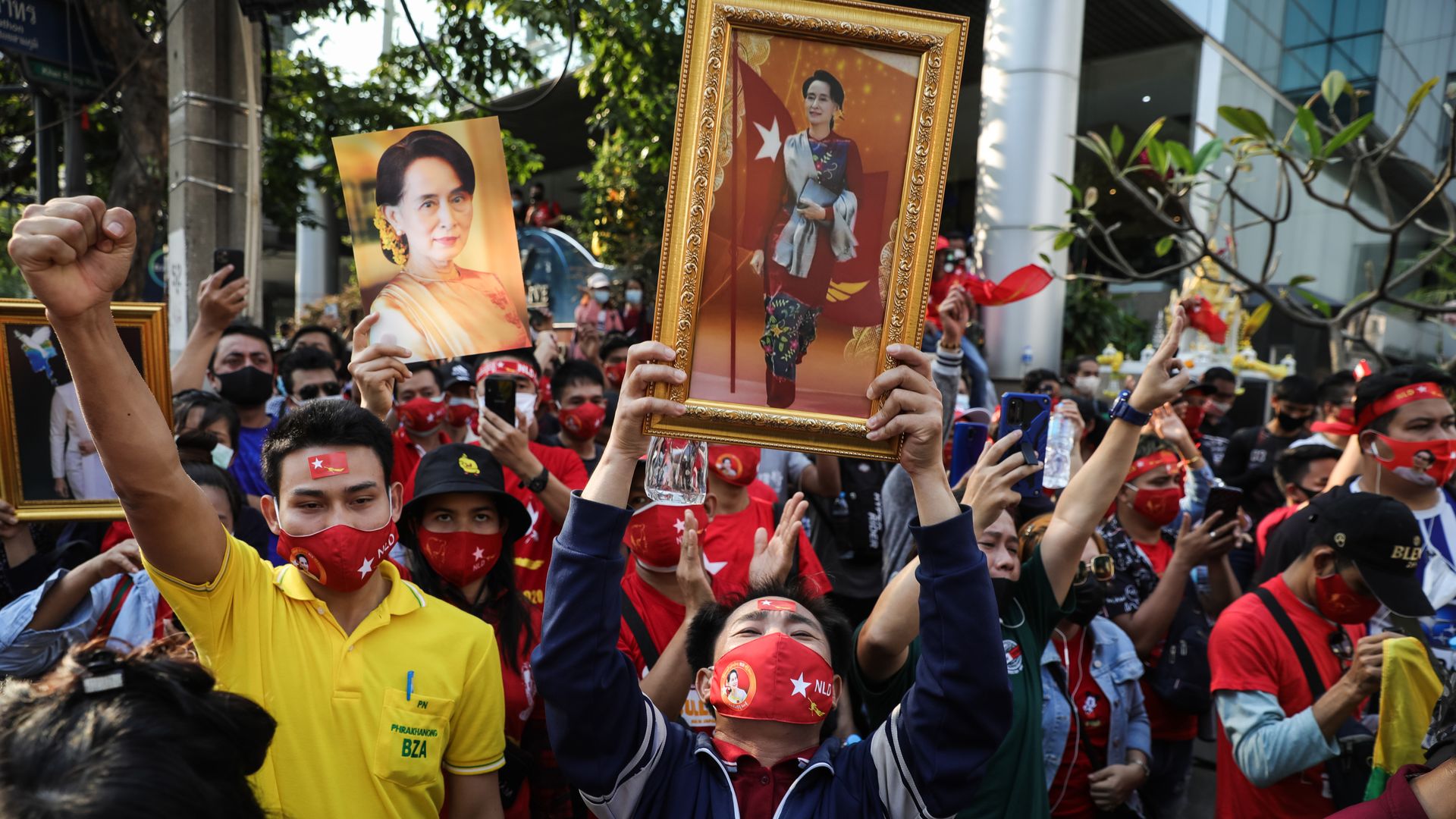 | | | Supporters of Aung San Suu Kyi protest outside the Myanmar Embassy in Bangkok. Photo: Lauren DeCicca/Getty Images | | | | 1. The military struck just as Myanmar's new parliament was due to sit. That would have sealed the results of November's general election, in which Aung San Suu Kyi's National League for Democracy won 83% of the seats up for grabs in a major embarrassment for the military and its political backers. Driving the news: Sensing a challenge to its authority, the military cried fraud. But international observers were still surprised when the arrests began and the military declared a one-year state of emergency. - Myanmar's swift return to military rule puts Suu Kyi back in the role of political prisoner. She became Myanmar's de facto leader in 2015, though the constitution guaranteed the military a major role in politics.
- But while deeply popular at home, the Nobel laureate is no longer seen as a democratic icon abroad since she deferred to the generals as they carried out an apparent genocide against Rohingya Muslims.
- What to watch: President Biden condemned the coup and suggested that sanctions would follow.
2. Thai authorities have charged dozens of people with insulting the monarchy, which carries a potential 15-year jail term. - The big picture: Protesters broke the taboo shielding their king from any criticism during months of protest last year. The government of Prime Minister Prayut Chan-o-cha, who first came to power in a 2014 military coup, is belatedly cracking down.
- Leading opposition politician Thanathorn Juangroongruangkit is among those facing charges.
- Go deeper: He spoke to Axios last October about the movement.
3. Vietnamese Prime Minister Nguyen Phu Trong, 76, will serve a third five-year term, the Communist Party announced today. - Why it matters: Trong's selection skirts party age and term limits, and he's in poor health.
- The government's handling of corruption and the pandemic on his watch have won praise.
- What to watch: An ideological conservative, Trong "is expected to maintain a foreign policy of balancing Chinese and American interests, while keeping the party's grip at home by continuing to suppress dissent through the imposition of long prison sentences," per the NYT.
|     | | | | | | 3. What Rob Malley thinks about Iran | 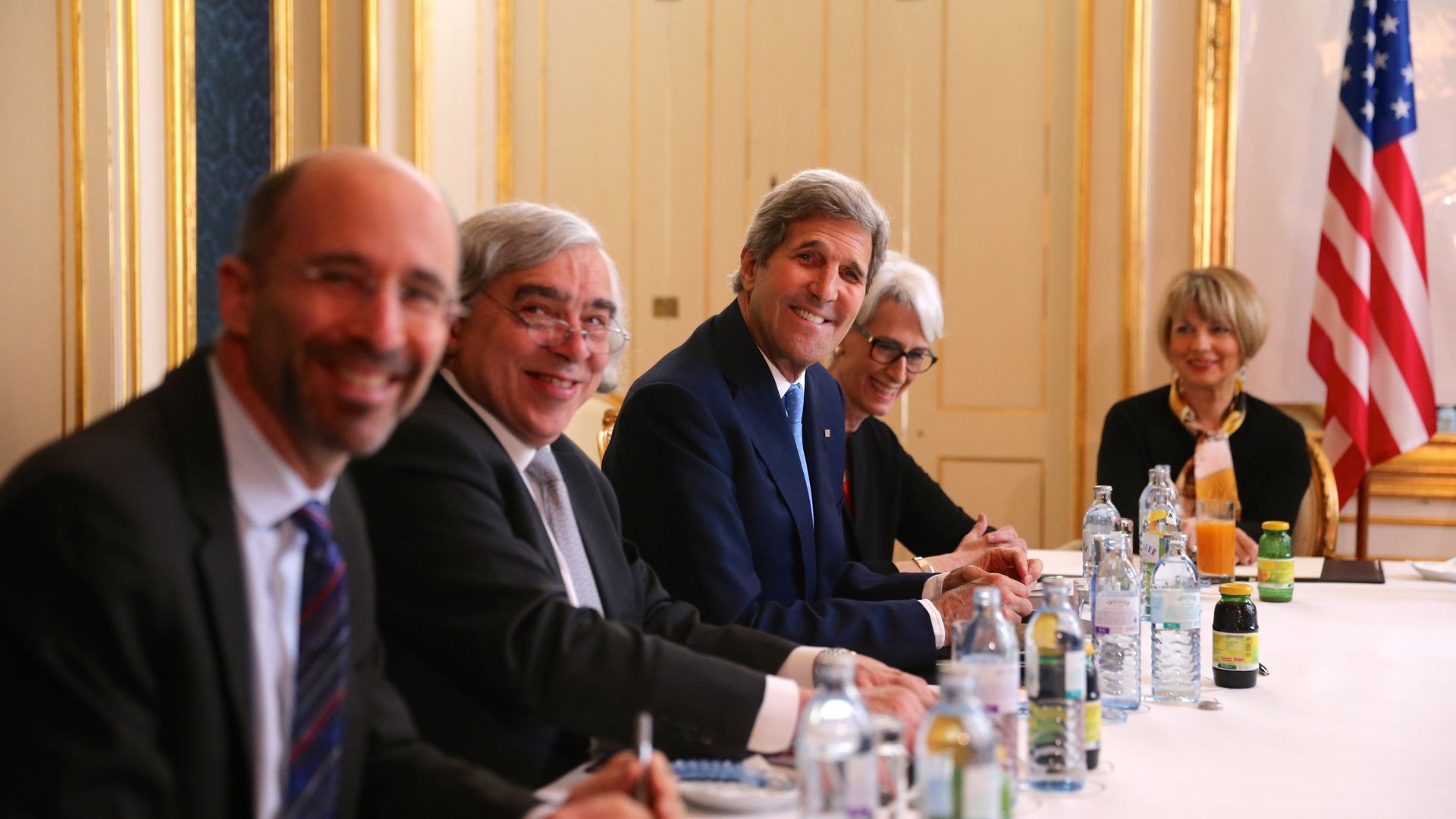 | | | Malley (L) during Iran deal negotiations in Vienna, 2015. Photo: Siamek Ebrahimi/Anadolu Agency/Getty Image | | | | Three weeks before Rob Malley was named the Biden administration's envoy for Iran, I spoke to him at some length about the path forward for the 2015 nuclear deal. Here are some takeaways from that conversation: Iran's nuclear acceleration: Malley said Iran's move to begin to enrich uranium to 20%, announced the day we spoke, would "complicate the atmosphere" but not "change the fundamentals." - "If Iran continues on its current path, you could see that the Biden administration won't like it but might say, 'OK, let's make a deal so that it stops,'" Malley said.
- "If they start taking steps that look like they are of a qualitatively different nature, such as curtailing inspections … that raises all kinds of other questions about what they might be up to and I think that changes the game."
Timeline: Malley said both sides have incentives to complete the "compliance-for-compliance" process — which would see the U.S. remove sanctions and Iran unwind its nuclear acceleration — before Iran's presidential elections in June. - The deal's unpopularity in "some political circles in Iran" could make it easier for an outgoing president to return to compliance than a new, hardline administration, Malley said.
- But, Malley added, "I don't think it should act as a gun to the Biden administration's head — that they need to reach a deal before then or otherwise they're not going to reach one."
- In any event, he said, the direction of travel in Iran would be set by the supreme leader rather than the outgoing or incoming president.
What to watch: "Some steps that Iran could take could backfire if their hope is to put more pressure. I think there comes a point at which more pressure might mean that the Biden administration will change course as well." |     | | | | | | A message from Raytheon Technologies | | Raytheon Technologies is defining the future of aerospace and defense | | |  | | | | At Raytheon Technologies, nearly 200,000 engineers, scientists and researchers are pushing the limits of known science to explore deep space, advance aviation and build smarter defense systems that protect all of us here at home. That's the future of aerospace and defense. Learn more at RTX.com. | | | | | | 4. Global news roundup | 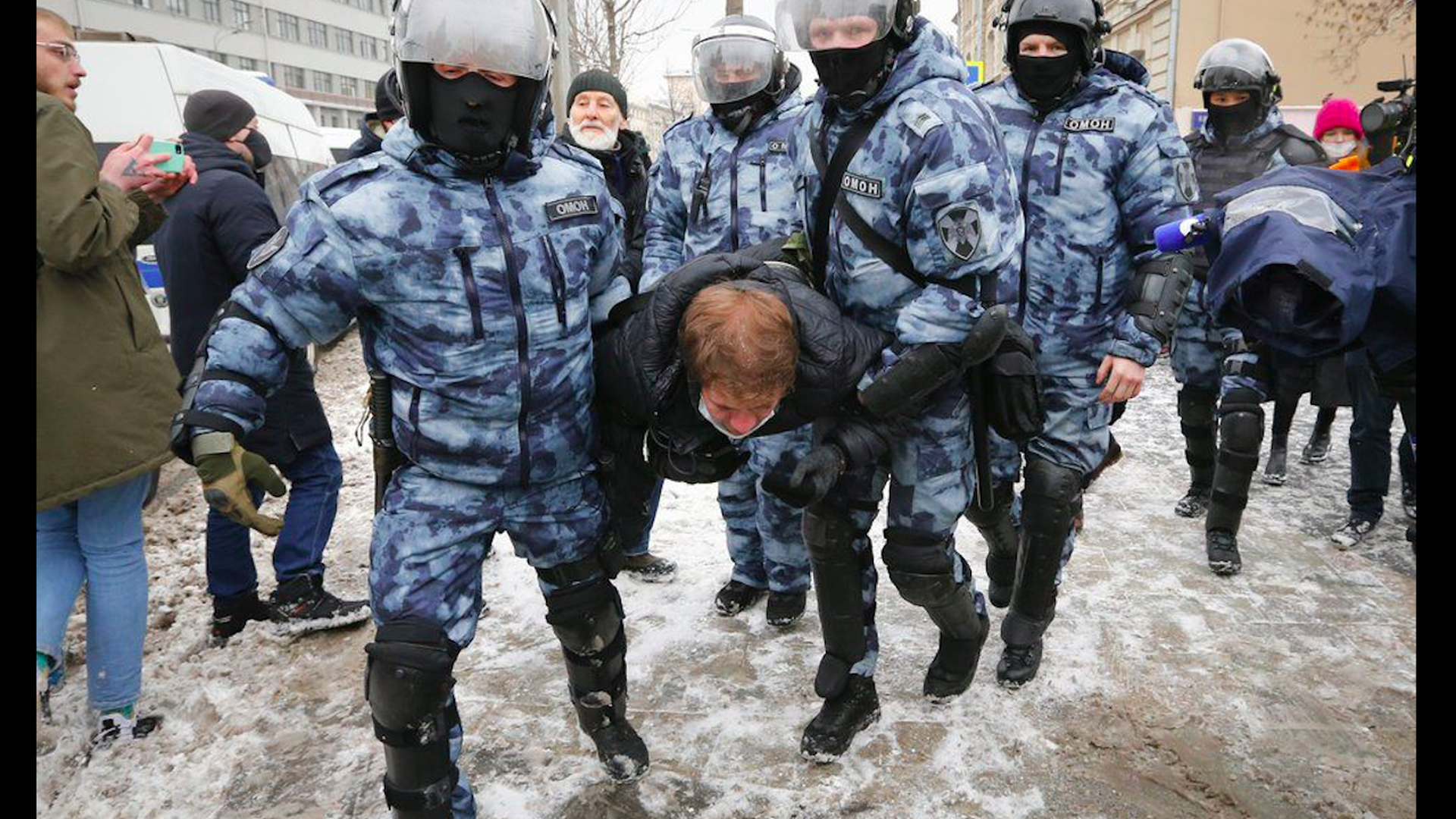 | | | Moscow police officers detain a demonstrator. Photo: AP Photo/Alexander Zemlianichenko | | | | 1. Alexei Navalny will stand trial on Tuesday, facing up to 3.5 years in prison, officially for violating the terms of a suspended sentence. Russia's prosecutor general has said he'll seek jail time 2. About 70% of Biden's picks for ambassadorial posts will be career Foreign Services officers, leaving 30% for political picks like top donors, people familiar with the matter tell Axios' Hans Nichols. - That's a smaller percentage of political ambassadors than under Donald Trump, but a continuation of the practice of giving plum posts to "the well-to-do and well-connected," says Brett Bruen, a former diplomat.
- Yes, but: Biden is under pressure to increase the diversity of his picks and is leaning more toward policy experts and politicians than donors, Hans reports. That has some donors "feverishly pressing their cases."
3. The EU's slow vaccine rollout has shed unflattering light on the European Commission and its president, Ursula von der Leyen. - Brussels convinced national governments to leave vaccine procurement to them, but it moved much more slowly than the U.S. and U.K., which have had more successful vaccine rollouts.
- "Those in the line of fire include French President Emmanuel Macron and Jens Spahn, Germany's health minister and a potential future chancellor," the FT notes.
- It's a contrast that U.K. prime minister Boris Johnson and other supporters of Brexit might well relish.
|     | | | | | | 5. Ukraine's Zelensky caught between two presidents | 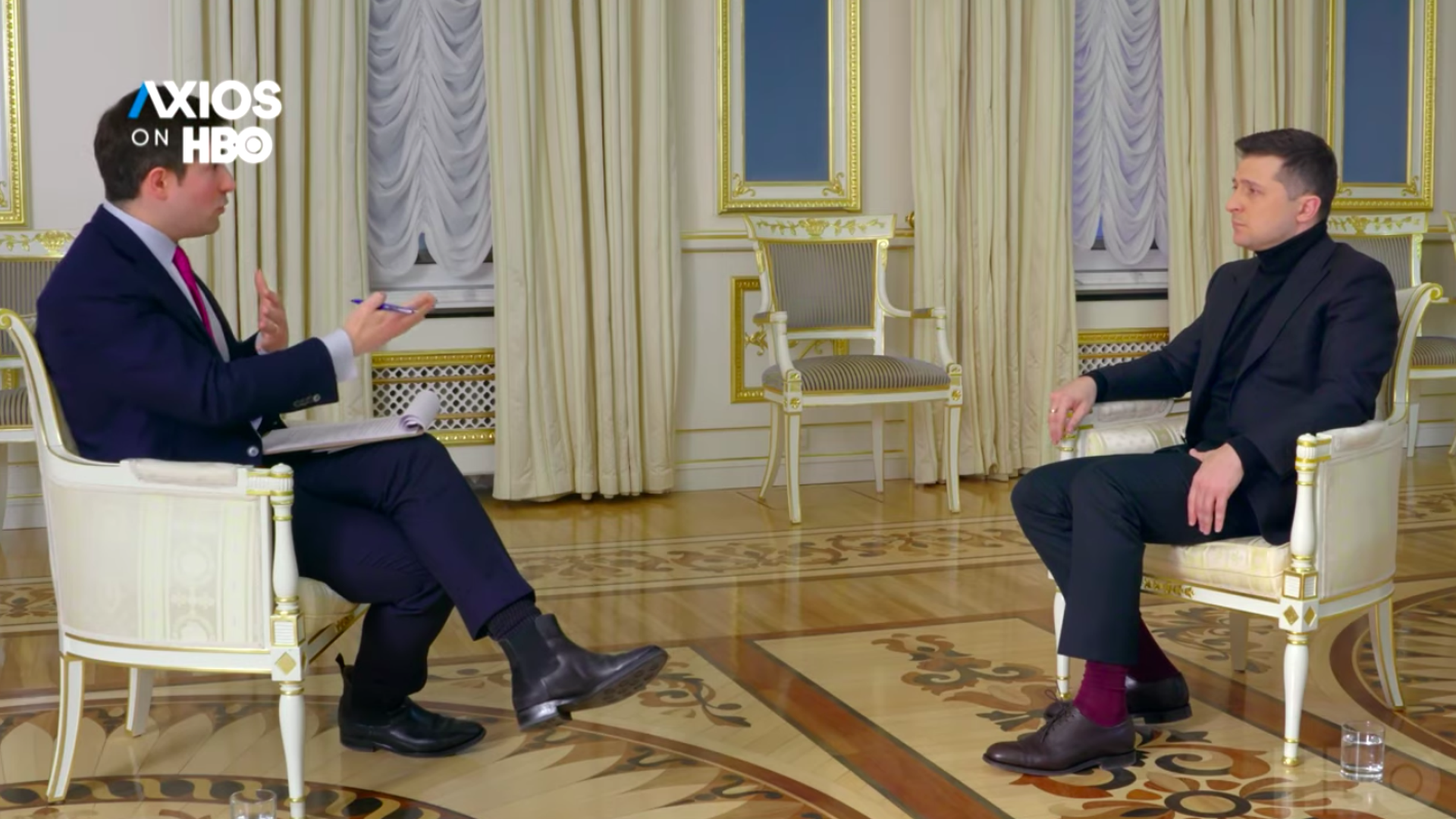 | | | Photo: Screengrab via "Axios on HBO" | | | | If Ukrainian President Volodymyr Zelensky could ask just one question of President Biden, it would be: "Mr. President, why are we not in NATO, yet?" Zoom in: The comedian-turned-politician is perhaps best known in America for a conversation with another U.S. president: the infamous phone call that led to Donald Trump's impeachment. He admitted to Jonathan Swan on "Axios on HBO" that he was "a little bit" angry with Trump for the way that saga played out. - But he was angrier over suggestions that he was "pressured" to do Trump's bidding — rather than acting as the president of an independent country.
- Zelensky told Swan he was shocked by the insurrection at the U.S. Capitol on Jan. 6, which he would never have imagined possible in the U.S.
- "After something happens like this, it would be very difficult for the world to see the United States as a symbol of democracy in the world," he said.
More highlights: - On vaccines: Zelensky said it was painful to be so far back in the line, and "very unpleasant to feel that you're standing there with your hand out." EU members had promised to help Ukraine "little by little," he added.
- On China: Zelensky said he did not see any threat from China to Ukraine, but he did feel the impact of the "cold war between China and the United States."
- On Russia: Zelensky said the war in eastern Ukraine never would have begun if Ukraine was a NATO member, and he acknowledged that if anyone truly knew how to get Vladimir Putin out of Ukraine, they would have done so by now.
Watch |     | | | | | | 6. What I'm not reading: Xi Jinping's biography | 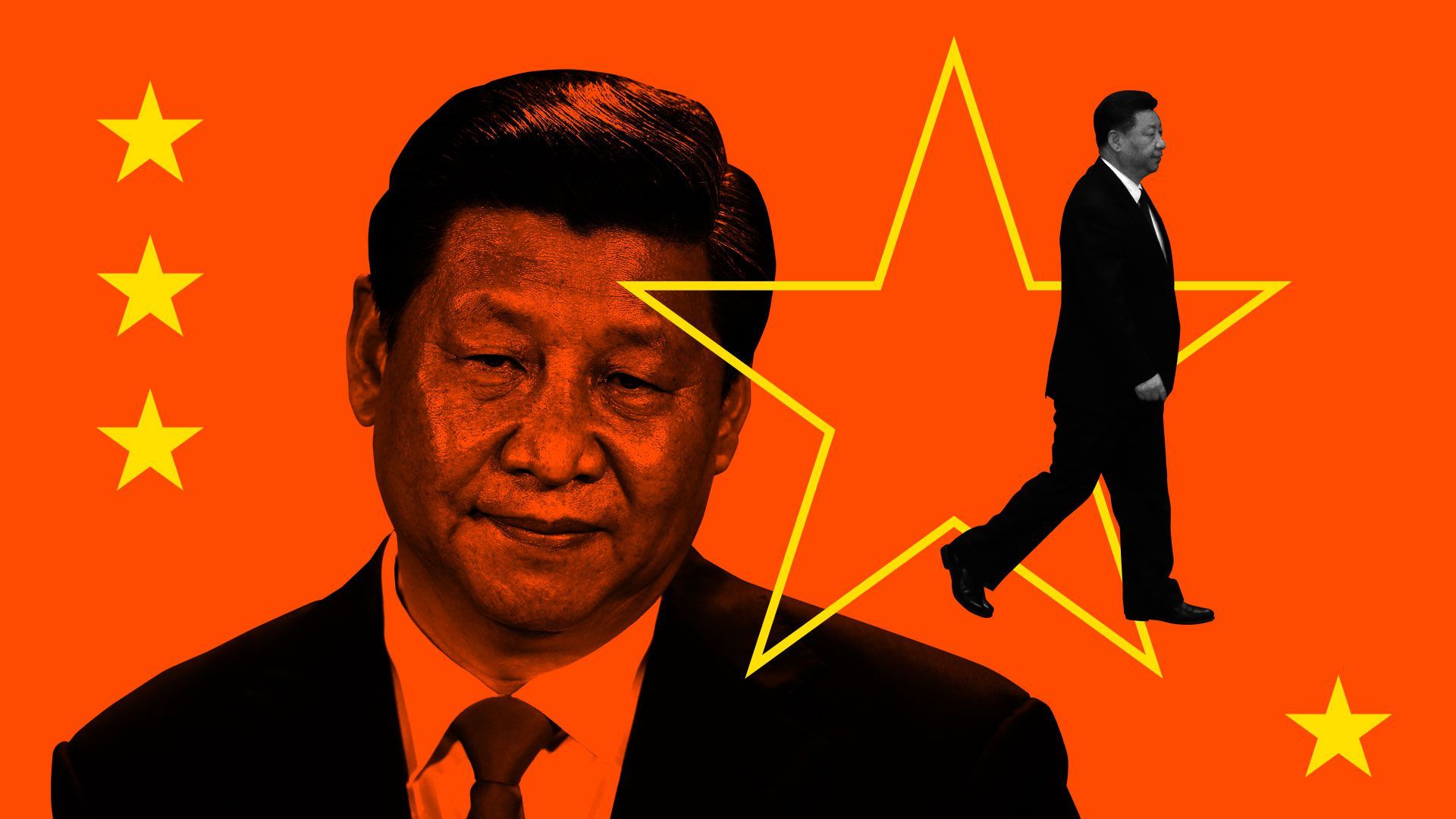 | | | Illustration: Lazaro Gamio/Axios | | | | Jeffrey Wasserstrom poses an interesting question in the Atlantic: "Why are there no biographies of Xi Jinping?" - He cites "a lack of credible sources who both know Xi and will speak candidly about him," the fact that Xi "almost never submits to questions, even friendly ones," and wariness of would-be biographers to take on such a weighty topic with so little to work with.
- "For one thing, it speaks to the extent of the clampdown Xi has overseen that so little is known about him, and that so few who truly know him are willing to speak about him," Wasserstrom notes.
Mike Forsythe of the NYT adds another reason: "the enormous personal cost." - "The CCP jealously guards his official story. Attempts to do in-country research on his youth or his decade in Fujian is dangerous for you, anyone working for you, and anyone you interview."
|     | | | | | | 7. Stories we're watching |  | | | Disinfecting a school in Bangkok, which reopened this week. Photo: Lauren DeCicca/Getty Images | | | - We're selling the coronavirus vaccine short
- U.S. and Palestinians re-engage after 3-year freeze
- China came up way short on Trump trade pact
- China crackdown prompts thousands to flee Hong Kong
- WHO team visits China hospital that treated first patients
- Canada curbs travel due to new COVID-19 variants
- New Zealand avoids second lockdown
Quoted: "No Guantanamo detainees have been vaccinated." — Pentagon spokesperson John Kirby announcing that the U.S. was "pausing" a plan to offer vaccinations at the detention center, which had sparked backlash from Republicans. |     | | | | | | A message from Raytheon Technologies | | Raytheon Technologies is defining the future of aerospace and defense | | |  | | | | At Raytheon Technologies, nearly 200,000 engineers, scientists and researchers are pushing the limits of known science to explore deep space, advance aviation and build smarter defense systems that protect all of us here at home. That's the future of aerospace and defense. Learn more at RTX.com. | | | | | | Axios thanks our partners for supporting our newsletters.
Sponsorship has no influence on editorial content. Axios, 3100 Clarendon Blvd, Suite 1300, Arlington VA 22201 | | | You received this email because you signed up for newsletters from Axios.
Change your preferences or unsubscribe here. | | | Was this email forwarded to you?
Sign up now to get Axios in your inbox. | | | | Follow Axios on social media:    | | | | | |











No comments:
Post a Comment